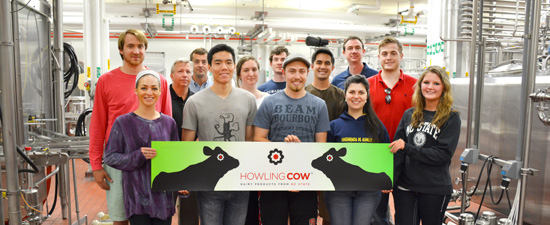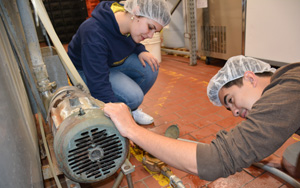Student project boosts sustainability at Howling Cow Creamery

The next time you enjoy a glass of NC State University’s Howling Cow milk or ice cream know that it’s being produced more sustainably than ever with the most recent advances coming courtesy of food science students.
This spring, 15 students in Dr. Clint Stevenson’s quality control in food and bioprocessing science class focused on improving sustainability in Howling Cow’s creamery, which processes up to 400,000 gallons of milk each year.
Tasked with using Six Sigma management techniques to advance one aspect of the creamery’s sustainability, three student teams researched the facility’s processes and chose to focus on enhancing efficiency of the case washer, which cleanses reusable plastic cases that transport milk.
“This project exposed students to a real-world problem that encouraged them to apply their skills and knowledge to seeking out sustainability problems and solving them,” Stevenson said.

Using meters at strategic locations, teams pinpointed areas of potential energy and water conservation, such as adding water-saving spray nozzles and decreasing washing speed to save energy. Students also hypothesized that improved flow of cleanser and adjustments in washing schedules would further enhance water quality.
“The entire group really did get exposed to a lot of the same techniques that a company might use,” said student Lucas DeLong.
For most students, who are preparing for careers in food science, this project was their first experience with sustainability issues in manufacturing.
“This project incorporated real-world experiences, which have not only extended my knowledge of defining, measuring and analyzing quality but also added to my confidence and resume,” said student Alexis Elia. “It has been an honor to help improve sustainability [at Howling Cow].”
As a service center within an academic unit, Howling Cow has opened its dairy doors to student and faculty involvement before, but this project was unique in advancing the creamery’s sustainability goals.
“Howling Cow’s day-to-day challenges are very similar to other corporate food production facilities,” said Carl Hollifield, Howling Cow’s business officer. “We struggle with facility and equipment renovations as they pertain to both sustainability and budgeting concerns. It’s critical for students to see a working model of how advancing sustainability affects product manufacturing.”
Though cost currently prevents the case washer from being replaced as some students suggested, Howling Cow has started implementing student ideas that will conserve more water and energy.
“The work done by the student group this semester has certainly moved us forward in our goals of becoming a more sustainable manufacturing facility,” Hollifield said.